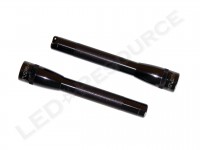 Raising the bar for LED flashlights once again, the new Mini Maglite Pro and Pro+ feature simple user interfaces yet deliver remarkable performance. It’s back to the basics with the Mini Maglite Pro’s single output mode for an impressive 226 lumens, but an additional, motion-controlled, low mode can be found in the Pro+ model. With an expected retail price of under $35 for the Mini Maglite Pro+, there’s no wonder there’s been much anticipation for these lights, so read on for more details!
Raising the bar for LED flashlights once again, the new Mini Maglite Pro and Pro+ feature simple user interfaces yet deliver remarkable performance. It’s back to the basics with the Mini Maglite Pro’s single output mode for an impressive 226 lumens, but an additional, motion-controlled, low mode can be found in the Pro+ model. With an expected retail price of under $35 for the Mini Maglite Pro+, there’s no wonder there’s been much anticipation for these lights, so read on for more details!
Key Specifications
- Output (Pro): 226 lumens
- Output (Pro+): 245 lumens high, 61 lumens low
- Intensity (Pro): 4,880 candela
- Intensity (Pro+): 5,600 candela
- Runtime (Pro): 2h 30min
- Runtime (Pro+): 2h 15min high, 27h low
- Battery: 2 x AA
- Length: 6.61″
- Diameter: 1.0″ bezel, 0.71″ body
- Weight with Batteries: 4.15 oz.
- Warranty: Limited Lifetime
- MSRP: $29.99 (Pro), $32.99 (Pro+)
- Actual Pricing: ~$30
Pricing & Ordering
MSRP for the Mini Maglite Pro is $29.99, with the Pro+ priced slightly higher around $32.99. Black is only available at the moment, but both models will be available in black, grey, blue, red, silver, or UCP camo.
In The Box
Included in the blister packaging are: Mini Maglite Pro/Pro+ LED Flashlight, 2 x AA Duracell alkaline batteries, and holster.
Batteries
Like the original Mini Maglite LED, both the Pro and Pro+ operate on two AA batteries. ANSI FL1 specifications for the lights are for alkaline batteries, but NiMH rechargeable and lithium primaries can also be used.
The Light
Head
The head features a plastic window and a deep smooth reflector. Optimal focus can be achieved with a quarter turn of the head, or the head can be removed for “candle mode.”
A glass window may be installed using Mag Instrument part #108-617.
Body
The entire light is type-II anodized aluminum inside and out, which prevents corrosion and also electrically insulates the light.
Knurling along the body of the lights ensures a solid grip but do not prevent the light from rolling when set on its side.
Tail Cap
Since these are twist-operated lights, there’s only a lanyard hole on the tail cap.
Modes
Multi-mode operation differentiates the Mini Maglite Pro+, which uses an accelerometer for selecting the power-saving low mode, from the single output Mini Maglite Pro.
Full Power (Pro+)
100% brightness at 245 lumens.
Power Save (Pro+)
Simply point the light straight down before turning it on for 25% brightness, or 61 lumens.
Performance
Using the same Cree XP-G LED as the XL200 and ML125, the Mini Maglite Pro and Pro+ are rated for 226 and 245 lumens, respectively. Not only is this an incredible amount of output compared to the current 77-lumen Mini Maglite LED, but the Pro and Pro+ holds ground even when compared to tactical CR123 or rechargeable lights.
At the point when the light turns on, the beam pattern tends toward that of a floody work light, which is ideal for work in a Pro-fessional environment (pardon the pun) where light is often needed at close range. With another quarter turn of the head, the beam reaches optimal spot focus.
Since the LED module is disconnected when the head is fully tightened, we’re pleased to report that there’s no parasitic standby drain to be found on either light.
Runtime
If you haven’t read our article about runtime graphs and the ANSI FL1 Standard, please click here.
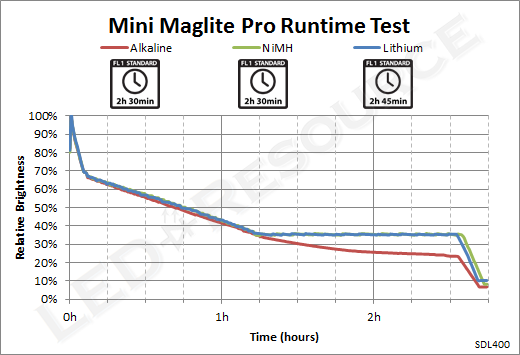

As efficient as LEDs are, heat is still produced and has to be dissipated, so step-down regulation is used to prolong battery life and reduce heat. This behavior does not give accurate comparisons for one runtime cycle, so we conducted an extended runtime test where we power cycled the lights to reset the timer.
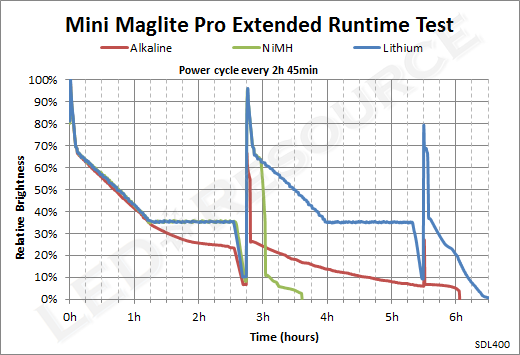

If the lights are operated with a 90% duty cycle (13.5 minutes on, 1.5 minutes off), maximum output is maintained for a shorter amount of time and the runtime graph resembles that of a flashlight without an automatic energy-saving step down.
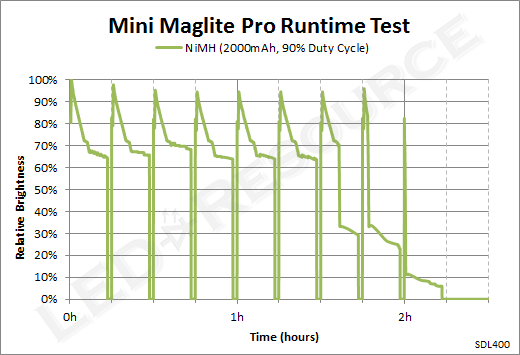
Accessories
Maglite includes a basic open-top holster with blister pack versions of the Mini Maglite, and the Pro/Pro+ are no exception.
An optional closed-top, open-bottom holster is available as an OEM accessory (useful if you plan to attach a lanyard to the light, since it may not fit in the included holster), and most Mini Maglite accessories such as anti-roll rings and glass windows are compatible.
Conclusion
Maglite has been continuously updating their product line over the past couple years, not only bringing performance and functionality to new levels, but also value. It’s no exception with the Mini Maglite Pro, which offers an unprecedented 200+ lumens for under $30. Priced only slightly higher than the Pro, the Mini Maglite Pro+ includes an accelerometer for intuitive mode-switching.
One thing that we would really like to see is an OEM tail cap switch upgrade, since the twist operation does require re-focusing the light each time it’s turned on. To put things into perspective, the low mode of the Mini Maglite Pro+ is about the same brightness as the high mode of the Mini Maglite LED. Even though these lights have impressive peak performance, they are also designed to be economical for everyday use.
| Pros | Cons |
|
|
Related Links

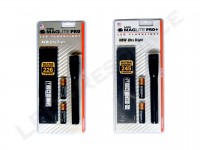
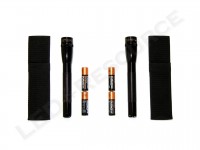
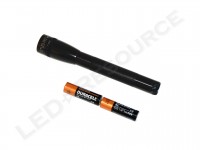
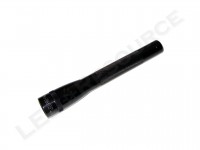
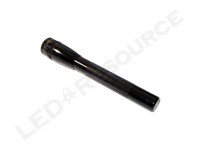
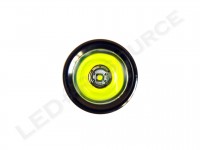
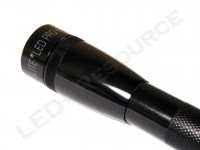
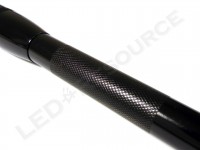
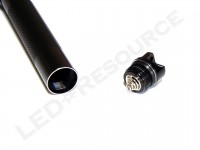
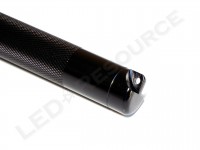
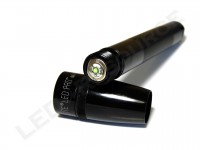
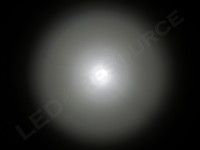
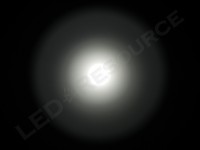
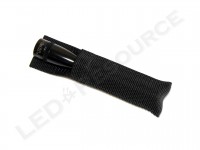
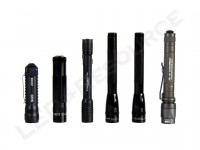


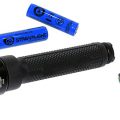

Was the lumen value in ‘low’ specifically measured for the(Pro+)? The reason I am asking is because Mag does not make the claim of 25% reduction in ‘low’ for the Pro+ as they do with the ‘low’ setting “Mag LED AA”, according to their website.
Antioch,
It says “Power Save (25%)” on the packaging, and I have also confirmed it with a light meter.
Hope this helps.
Robin
Robin:
Thanks for a great review! I especially appreciate the extra work on runtimes – very informative.
I linked my own review of the Pro+ on BLF to this one: http://budgetlightforum.com/node/8080
Thanks for this great review!
I don’t know if I buy the PRO now or wait for the minimag with body click switch…yes…they are designing a new model…
Nice review. I had read this review a couple of times which convinced me to order the Mini Mag Pro. I have been using it for a couple of weeks now with some NiMH batteries with no problems. Not the fanciest or most expensive light I have but it is quickly becoming one of my favorites. Really appreciate the runtime graphs.
I have found your reviews for the ML100, ML125, and minimaglite pro and pro+ flashlights helpful. I have a few of questions that I hope you can help answer.
1. For the ML100, ML125 and Pro+ on LOW, is the output consistent, or does it regulate like the flashlights do on high?
2. Do you have any runtime graphs for the flashlights on low?
3. Can any of the Maglites tail stand?
4. And finally, do you think having the accelerometer to control brightness on the the larger maglite flashlights (C and D) would be a good UI? I was thinking that a press and hold to turn on and then rotate the wrist to control brightness is a more natural motion than with the XL100 and XL200 flashlights.
Thank you again for all your info.
Sam,
We have not done any runtime tests on low because it will take many hours, but I can definately look into it and do a partial test.
All three lights that you mentioned can tail stand, the ML-series has a flat tail cap, and the Mini Maglite series can be used in Candle Mode.
Hope this helps!
Robin
A truly impressive light. With ordinary indoor lighting, having the bright beam shone in one’s face from 30 feet away is practically blinding, and leaves one with an uncomfortable afterimage effect for several minutes after just a second or so of exposure. If this was shone into someone’s dark-adapted eyes from a few feet away I’d guess they’d be pretty much disabled for further action for a while. Heh, if you closed your own eyes just as it came on, you’d have a nice time watching a nighttime marauding miscreant stumbling helplessly around in the dark for a while afterward. And then, if you were feeling particularly sadistic, you could repeat the process! OUCH!
– MJM
A question: I notice the later start up brightnesses in the graphs are significantly lower than the initial start-up brightness. Am I understanding correctly that this is a function of the charge in the battery? Thus I could expect that if I turned it on only for a minute or two at a time at various times when it was needed I would be able to achieve that maximum brightness for a good number of such on/off cycles?
– MJM
Michael,
That is correct. Battery voltage will decrease as during discharge, which results in less power provided.
If you use the light momentarily, you will get the type of behavior seen in the 90% duty cycle graph (the last one).
Hope this helps.
Robin
Thank you for the quick response Robin! I’ve since discovered two other things:
1) If you page back up to your pic of the two beam images and stare at one of them for just five seconds or so and then switch your eyes over to the white side of the page (or switch to an app that gives you a white screen straight from gazing at the image) you’ll find an afterimage of the beam burned into your retina! The Pro+ is so bright it gives you secondhand eyeburn! LOL!
2) While comparative conditions aren’t really perfect for the experiment (I no longer have access to the original window vantage point.) I *think* the Pro+ may not be QUITE as strong as the 10 megaCP searchlight when it comes to lighting up an entire building facade a couple of hundred yards away. Of course it’s a bit easier to carry around than the ten pound searchlight, so I guess I shouldn’t complain.
:>
Michael
Just realized my searchlight ref didn’t include the backstory that I’d given in another email or post earlier. I’d tested a 10 million candlepower searchlight a while back and was comparing it to the Pro+. The Pro+ from 30 feet away was just about as blinding to the eyes as the searchlight — which amazed me!
– MJM
Just got a mini mag pro today. Nice at first. Until the led srarted to smoke. Too much power going to the led. The gell plastic mold on the led turned black and melted. Bad design. Im taking it back. Recall.
Jim,
That’s definitely not normal. Were you trying to use lithium-ion 14500’s? We didn’t have any problems with our Mini Maglite Pro/Pro+ lights, even during extended runtime tests.
Robin
Hi,
Is there a noticeable difference between the Pro and Pro+ (High power mode, 226 vs 245 lumens)?
In Canada, the price for the Pro is $20, and Pro+ is $40.
Is it worth paying extra $20 for the extra 19 lumens?
I don’t really care the low power mode.
Thank you very much
Matthew,
Usually, there has to be a 25-50% increase in output for it to be perceptible, so I doubt you’ll be able to tell the difference between 226 and 245 lumens.
Since you don’t need reduced output, the Pro would make more sense.
Robin
I have recently purchased the Mini Mag Pro for a new job. I used to use the standard AA led light and it quit working when I would try to twist it on, so I wanted to get a new one. I went to a local store and purchased the Pro. I was hoping it would be new and improved and not give the same issues as the old, but I was wrong. I bought the new flashlight on November 1, 2013 and about a week after purchasing it I am having the same issues. The other one was like new, but older and this one is new. I am a supervisor for a company and wanted it to inspect parts. The light does not see any abuse, but it still suffered the same fate, after literally 15 minutes of bulb life. Please help.
Rich,
Have you checked that the tailcap is tight? Try calling Maglite and see if they have any suggestions. If all else fails, you can try getting an exchange it with the retailer.
Robin
Rich,
I had the same problem with my Mag pro. It seems that the new tailcap only makes electrical contact with the body of the flashlight at the upper edge, not along the entire threaded portion like the standard mini-mag (different design due to lack of a spare bulb). If the tailcap isn’t perfectly tight, as Robin said, there’s no contact. I replaced the pro’s tailcap with one from a standard mini-mag, and have had no problems since.
Hope this helps!
-Matt
I wanna know the life of LED module for Maglite pro.